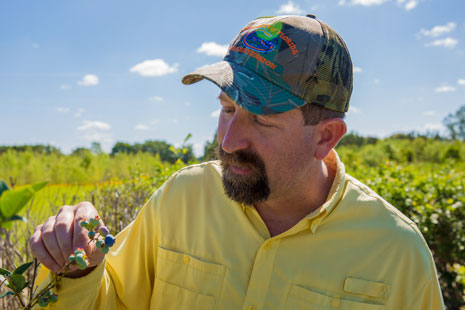Dr. Phil Harmon
Professor

Contact:
Phone: (352)-273-4622
Email: pfharmon@ufl.edu
Office: Rm. #1424, Fifield Hall
2550 Hull Road
Gainesville, FL, 32611
About
Philip F. Harmon is a professor of plant pathology and extension specialist. He received his undergraduate and doctoral degrees from Purdue University. His research interests include diseases of warm season turfgrass species and disease management for southern highbush blueberry. In addition to providing efficient and effective disease management strategies for clientele, additional research goals include selection for turfgrass and blueberry disease resistance in collaboration with plant breeding programs.
His extension efforts have focused on providing rapid and accurate diagnostic services to the turfgrass, small fruits, and ornamental plant industries. Recommendations given as part of diagnostic services include practical, research based, disease management solutions. He has served as an assigning editor for Plant Disease Management Reports and as an associate editor of Applied Turfgrass Science.
-
Education
Ph.D. Plant Pathology, Purdue University, 2003
B.S. Plant Science, Purdue University, 1999
-
Extension
Rapid Turfgrass Diagnostic Service
- Address plant pathology needs and concerns of clientele groups that I serve
- Convey University of Florida research findings to the turfgrass industry through updated disease diagnostic services and recommendations for efficient and effective disease management strategies
- Assist other state and county faculty with plant pathology needs in their extension programs through in-service trainings, invited presentations, fact sheet and slide set development, and assistance with special plant disease problems
-
Turfgrass Research
- Investigate and improve rapid methods for turfgrass disease diagnosis
- Find new integrated approaches to disease management by investigating:
- New chemistry evaluation
- Timing and application technology studies
- Programmatic fungicide rotation plans
- Incorporation of cultural and biological management options
- Pathogen identification and characterization for new disease problems and disease complexes currently not well understood
- Publications
